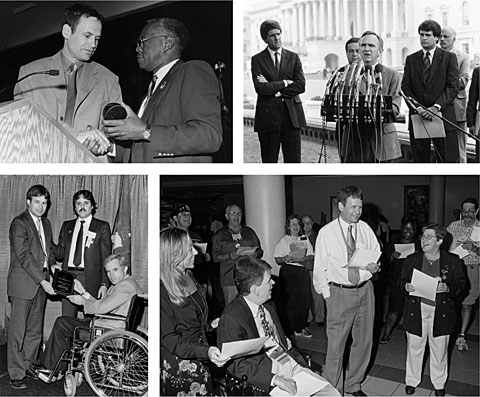 |
||||||||||||
|
January/February 2015
“Lane Evans built his congressional career on honesty, integrity, and a commitment to veterans of Vietnam whose needs had been ignored for too long,” said Rick Weidman, VVA’s executive director for policy and government affairs. “He opened a dialogue on such issues as the effects of Agent Orange and other herbicides, and the need to extend the time Vietnam-era veterans could request readjustment counseling from the VA, at least in part because of the debilitating effects of post-traumatic stress disorder.” The twelve-term congressman from Illinois died November 5 in East Moline after a long battle with Parkinson’s disease. He was 63 years old. Many legislators are fortunate to have had one defining piece of legislation in their careers. Lane Evans had two: The Veterans’ Judicial Review Act of 1988, which for the first time facilitated judicial review for veterans whose VA claims had been denied, and the Agent Orange Act of 1991, the sweeping legislation that mandated research into the long-term, service-connected effects of herbicide exposure. “He spoke out often and early,” Weidman said. “On these and other issues, he was far ahead of his colleagues.” Evans also was an early advocate of the need for research and treatment for veterans of the Persian Gulf War Lane Evans enlisted in the Marine Corps in 1969, immediately following his graduation from high school. He served in Okinawa and was discharged in 1971. Afterward he enrolled at Augustana College, then went on to Georgetown University Law Center, where he received his law degree in 1977. “Even in law school, Lane knew he wanted to pursue a life of public service,” said VVA National President John Rowan. “He wanted to use his legal expertise to help create a world better than it had been, especially for veterans.” After four years as an attorney with the Quad Cities Legal Clinic in Illinois, Evans decided to serve his country a second time. He ran for a highly contested seat in Congress in 1982, and won by just 5 percent of the vote. Evans quickly became an outspoken advocate for veterans issues, which he felt were given very little attention in Congress. Even as a well-respected senior legislator, Evans never thought of himself as different from anyone else. “He was just ‘Lane,’ ” said Marc Leepson, senior writer for The VVA Veteran. “Even if he were sitting across from you, he’d have his tie loosened, and would speak to you like a regular person. He always lived by the courage of his convictions.” Although Evans was diagnosed with Parkinson’s in 1995, he worked tirelessly in spite of his health, and served an additional eleven years in Congress, becoming the Ranking Democrat on the House Veterans’ Affairs Committee before retiring in 2006. Former VVA President Tom Corey said that even as Evans’s health deteriorated, he did everything in his power to attend VVA functions. “Lane made it part of his schedule to be part of Board meetings, Leadership Conferences, and Conventions,” Corey said. “The Conventions were almost always right around his birthday. He and his VVA brothers would share birthday cake and stories. He was one of us.” “Congressman Evans gave a voice to thousands of Illinois veterans and worked to rid the stigma that often surrounds combat-based injuries,” said Sen. Mark Kirk (R-Ill.). Rep. Cheri Bustos, a Democrat who now represents Evans’s district, praised his legacy of service. Lane Evans, she said, “represented everything that is right about public service. He was a champion for our region in the halls of Congress and a strong advocate for veterans and working families across the country.” Former President Corey considered Lane Evans a friend who “was a caring, kind, gentle man. He was a true servant for veterans and for all of mankind.”
|
||||||||||||
|
|
||||||||||||
|
|
||||||||||||
8719 Colesville Road, Suite 100, Silver Spring. MD 20910 | www.vva.org | contact us |
||||||||||||










 BY MONTE MONACO
BY MONTE MONACO